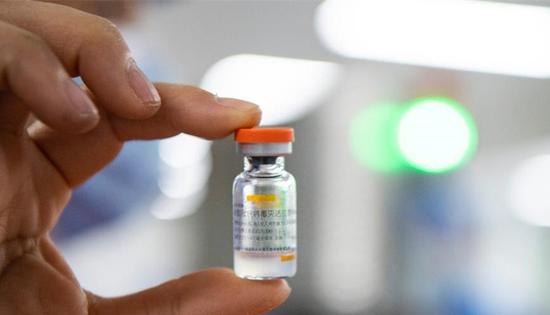Frontline health workers, journos in Cambodia feel safe after getting 1st doses of Chinese COVID-19 jabs
Thong Kimsoklina, a nurse at the National Pediatric Hospital of Cambodia, felt quite happy on Thursday after receiving her first shot of the China-donated COVID-19 vaccine.
The 41-year-old nurse always faced the fear of getting infection and passing the infection to other people, friends and family members, but now with the vaccination, she felt relieved.
"In the hospital, I meet from 180 to 200 patients a day, so the vaccine is necessary for me to prevent the transmission of the disease to other people, patients and my family members," Kimsoklina told Xinhua after getting her first dose of the jab.
"Before I got vaccinated, I thought that risks of getting infection were high," she said. "After getting the vaccine, Now, I feel pretty safe."
Dressed in a nurse uniform, Kimsoklina, who was among scores of frontline healthcare workers and journalists to get the vaccine on Thursday morning, said she was quite confident in the quality and efficacy of the China's Sinopharm COVID-19 vaccine.
"The vaccine is good because I'm fine after receiving the first shot. It's good, and thank China for providing it to the Cambodian people," she said.
Similar views were expressed by Bin Phal, a doctor at the Sok San Poly Clinic in Phnom Penh, and Pheng Y, a reporter for Apsara TV station, after they got their first shots of the jabs.
"My job faces high risks of getting infection, so I got vaccinated in order to protect myself and to prevent the spread of the disease to family members and people around me," Phal said, adding that he usually met about 40 patients and their family members per day.
"I'm 100 percent confident in the vaccine," he said. "I feel safe after getting the vaccine; however, I still follow the Ministry of Health's guidelines: washing hands, wearing face masks and keeping social distancing."
Pheng Y said as a reporter, he needed to attend events or to meet people every day, so getting the vaccine was very important for him.
"After receiving the first dose of the vaccine, I feel much safer to go out to report on news stories," he said. "I'd like to encourage all members of the press to come for the vaccine for your own safety as well as for the safety of all people in our country."
The Southeast Asian country launched an anti-COVID-19 inoculation drive on Feb. 10 after receiving the first batch of Sinopharm vaccine from China.
The priority groups to get the jabs include frontline healthcare personnel, government members and officials, Senate and Parliament members and officials, municipal and provincial governors, armed forces, police and journalists, among others.
According to an official report, as of Thursday, a total of 16,612 people including 2,169 women had been inoculated with the vaccine.
Ung Sophal, a doctor in charge of the inoculation site at the National Pediatric Hospital of Cambodia, said public interest in the vaccine is high; however, due to a limited number of vaccine, only priority groups can get it.
"I see the vaccine as a bullet-proof vest to protect ourselves from the COVID-19," he told Xinhua. "I'd like to thank China for always helping our Cambodian people, and I consider this vaccine as a very valuable gift to protect our people's lives from this highly contagious disease.
Cambodia has done well to contain the spread of COVID-19. The kingdom has so far registered a total of 483 confirmed COVID-19 cases, with zero deaths and 470 recoveries, according to the Ministry of Health. Enditem

